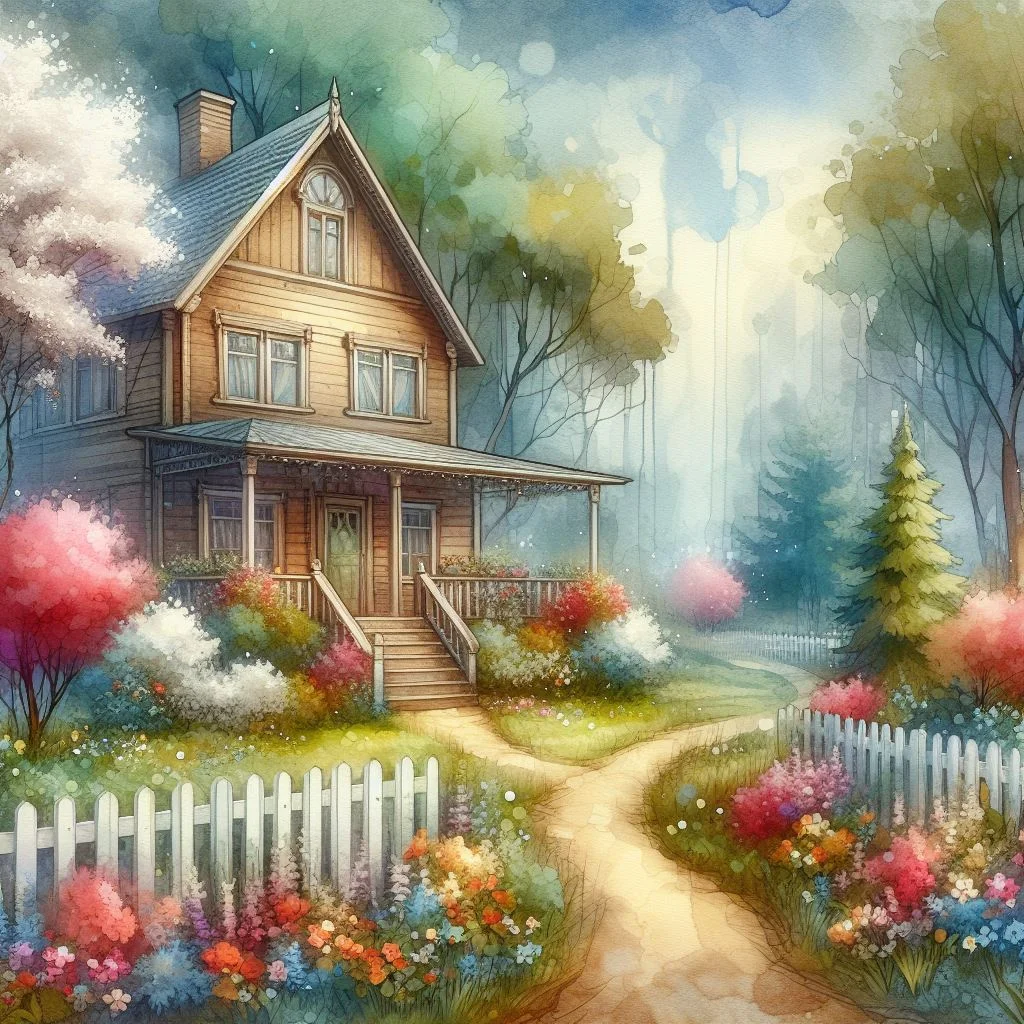Dream of Childhood Home: Unraveling the Mysteries of Desires
Dreams have long fascinated humanity, serving as windows into our subconscious minds and offering glimpses into our deepest desires, fears, and memories. Among the myriad dream themes that people experience, dreaming of a childhood home is a common and profound occurrence. This article delves into the intricate layers of such dreams, exploring their psychological, emotional, and symbolic significance.

Table of Contents
Understanding the Symbolism of Childhood Home Dreams
- Nostalgia and Emotional Connection
Childhood homes often evoke powerful emotions and memories. These places are imbued with the experiences that shaped our early years, from joyous celebrations to formative challenges. Dreaming of a childhood home can manifest nostalgia, a longing to reconnect with more straightforward, innocent times. This dream may surface when experiencing significant life changes, seeking comfort in the familiar and the known.
- Psychological Roots
Psychologically, the childhood home represents the foundation of one’s identity. It is where core values, beliefs, and behaviors were first instilled. Dreaming of this place can indicate a need to revisit and understand these foundational aspects of oneself. It also reflects a desire to resolve unresolved issues from the past or to integrate childhood experiences into one’s current life narrative.
Common Themes in Childhood Home Dreams
- Exploring Old Rooms
Dreams of wandering through the rooms of a childhood home can signify a journey through different facets of one’s personality. Each room may represent various stages of life or other emotions. For instance, a bedroom could symbolize personal growth and intimacy, while a kitchen might represent nourishment and familial bonds.
- Encountering Family Members
Seeing family members in these dreams often highlights unresolved family dynamics or a yearning for familial support. Positive interactions with family in the dream can symbolize harmony and acceptance, while conflicts may point to lingering issues that need attention.
- Changes in the Home’s Appearance
Noticing changes in the appearance of the childhood home, such as renovations or decay, can mirror one’s perception of personal growth or decline. A well-maintained home might indicate a strong, positive connection to one’s past, while a dilapidated home could reflect feelings of neglect or unresolved trauma.
The Psychological Interpretations
- Freudian Perspective
Sigmund Freud, the father of psychoanalysis, believed that dreams are manifestations of repressed desires and unresolved conflicts. From a Freudian perspective, dreaming of a childhood home might represent a return to the origin of these repressed emotions. Dreaming of a childhood home could be a way for the subconscious mind to process and resolve past traumas or to fulfill unmet childhood needs.
- Jungian Analysis
Carl Jung, a contemporary of Freud, viewed dreams as a means of achieving self-discovery and individuation. In Jungian analysis, a childhood home can symbolize the dreamer’s inner self and the process of integrating different aspects of their personality. This dream could be an invitation to reconcile with one’s past and embrace all parts of oneself.
Emotional Significance
- Security and Safety
A childhood home often represents a place of safety and security. Dreaming of such a place can be a comforting experience, especially during stress or uncertainty. Dreaming of such a place may indicate a need for reassurance and a desire to return to a time when life felt more predictable and secure.
- Unresolved Emotions
Conversely, if the dream evokes negative emotions, it could indicate unresolved issues. Feelings of fear, anger, or sadness associated with the childhood home in the dream suggest that past experiences still need to be addressed and healed.
Cultural and Social Contexts
- Cultural Significance
The meaning of a childhood home can vary greatly depending on cultural context. In some cultures, the home is considered a sacred space embodying family heritage and continuity. Dreaming of a childhood home in such cultures might carry additional layers of meaning related to ancestry, cultural identity, and familial obligations.
- Social Influences
Social factors, such as the nature of one’s upbringing and family dynamics, also play a crucial role in shaping the significance of these dreams. For instance, someone from a close-knit family might experience these dreams differently than someone with a tumultuous or distant family relationship.
Case Studies and Examples
- Case Study 1: Sarah’s Journey to Self-Understanding
Sarah, a 35-year-old woman, frequently dreamed of her childhood home during a career transition period. In her dreams, she often found herself in her old bedroom, feeling a sense of peace and comfort. Through therapy, Sarah realized that these dreams were her mind’s way of seeking stability and reassurance during uncertainty. Revisiting her childhood home in her dreams helped her reconnect with her core values and regain confidence in her decisions.
- Case Study 2: Mark’s Unresolved Family Dynamics
Mark, a 40-year-old man, had recurring nightmares about his childhood home. The house was always dark and foreboding in his dreams, and he often encountered his estranged father. These dreams reflected Mark’s unresolved anger and pain from his tumultuous relationship with his father. By addressing these emotions in therapy, Mark was able to heal and eventually found that his dreams of the childhood home became less distressing and more neutral over time.
Practical Steps for Dream Interpretation
- Keeping a Dream Journal
Recording dreams in a journal can provide valuable insights into recurring themes and emotions. Writing down details upon waking helps identify patterns and understand the underlying messages of the dreams.
- Reflecting on Current Life Circumstances
Connecting the dream to current life events can offer clues about its significance. Reflecting on how the emotions and scenarios in the dream relate to present challenges or changes can provide a deeper understanding.
- Seeking Professional Guidance
For those who find their dreams particularly troubling or confusing, seeking the help of a therapist or dream analyst can be beneficial. Professionals can provide tools and techniques to interpret and work through the emotions and themes presented in the dreams.
Conclusion
Dreaming of a childhood home is a powerful experience that can reveal much about one’s inner world. Whether it evokes feelings of comfort or unease, such dreams serve as a bridge between the past and the present, offering opportunities for healing, self-discovery, and personal growth. By exploring these dreams’ symbolism, psychological roots, and emotional significance, individuals can gain valuable insights into their subconscious minds and navigate their waking lives with greater awareness and understanding.
Understanding and interpreting dreams of childhood homes is a fascinating exploration of the subconscious and a profoundly personal journey. Each dream is unique, shaped by individual experiences and emotions. By paying attention to these dreams, we can uncover hidden aspects of ourselves, resolve past conflicts, and ultimately move towards a more integrated and fulfilling life.
A Journey Through Time: Unraveling Childhood Home Dream
Dreams, those enigmatic journeys into our subconscious, often leave us with vivid memories and lingering questions. One particularly potent dream theme involves our childhood home – a place imbued with comfort, security, and formative experiences. But what does it mean when this familiar space reappears in our dreams? Buckle up, as we delve into the potential interpretations of this symbolic landscape.

Nostalgia’s Warm Embrace
Oftentimes, dreaming of your childhood home signifies a yearning for simpler times. It might evoke a desire for the comfort and security you felt as a child, a haven from the complexities of adulthood. Perhaps you’re facing challenges or transitions, and your subconscious seeks solace in memories of stability and belonging.
Revisiting Your Roots
Beyond nostalgia, your childhood home can symbolize your core identity and values. It represents the foundation upon which you built your personality, beliefs, and worldview. Returning to this space in a dream could indicate a desire to reconnect with your authentic self, to rediscover the values and dreams that shaped you.
Navigating Transitions
Significant life changes, like career shifts or relationship milestones, can trigger dreams of your childhood home. This familiar setting can act as an anchor, providing a sense of grounding and reminding you of your inner strength and resilience as you navigate new beginnings.
Confronting Unresolved Issues
While dreams often offer comfort, they can also surface unresolved emotions or conflicts from your childhood. If your dream home feels unsettling, it might represent unresolved issues with family members, past traumas, or unfulfilled desires. Facing these emotions head-on can be a crucial step towards personal growth and healing.
Remember
The meaning of your childhood home dream is unique to you. Consider the emotions you felt in the dream, the state of the house, and any specific details that stood out. Journaling about your dream and reflecting on its connection to your current life can offer valuable insights.Ultimately, your childhood home dream is an invitation to explore your inner landscape. By deciphering its symbols and connecting them to your waking life, you can gain a deeper understanding of your values, desires, and challenges, empowering you to move forward with greater clarity and purpose.
Bonus Tip
If your dream home feels particularly vivid or recurring, consider seeking professional dream analysis for further guidance.I hope this article sparks your own exploration of this fascinating dream theme. Remember, your dreams hold valuable messages waiting to be discovered!
Exploring the Meaning of Dreams About Your Childhood Home
Our childhood home is more than just bricks and mortar; it’s a repository of memories and emotions and the foundation of who we become. So, it’s natural that these familiar spaces find their way into our dreams. But what does it mean to dream about your childhood home?The answer, like the house itself, can hold many rooms. Let’s unlock some doors and explore the potential interpretations of these profoundly personal dreams.
A Yearning for Security and Comfort
Dreaming about your childhood home often signifies a longing for a sense of security and comfort. This could be triggered by feelings of stress, anxiety, or uncertainty in your waking life. The familiar sights, sounds, and smells of your childhood home evoke a sense of safety and belonging, a feeling you might be craving in the present.
Reflecting on Your Roots and Identity
Your childhood home represents your foundation, the experiences, and the relationships that shaped you. Dreaming about it could indicate a period of introspection when you’re reevaluating your values, beliefs, and path. Perhaps you’re questioning your choices or yearning for a simpler time.
Processing Unresolved Issues
Sometimes, our childhood homes hold unresolved conflicts or negative experiences. If your dream evokes sadness, anger, or fear, you might not have fully processed these emotions. The dream could prompt you to revisit these issues and find closure.
The State of Your Current Home Life
The condition of the house in your dream can also be significant. Is it well-maintained and full of light, or run-down and shadowy? The dream might be reflecting your feelings about your current living situation.
Transition and New Beginnings
Dreaming about your childhood home can also symbolize transition and new beginnings. Perhaps you’re about to embark on a new chapter in your life, and the dream represents a letting go of the past to make way for the future.
Who You Were vs. Who You Are
The dream could also be a way for your subconscious to compare your present self to the person you were when you lived in that house. Are you happy with the trajectory of your life?
Remember,
the details matter!
- The age you were in the dream: Were you a child again, or your current age? This can reveal whether you’re yearning for a specific time in your childhood or seeking a sense of childlike wonder in your present life.
- The emotional tone of the dream: Were you happy, scared, or indifferent? The emotions can guide you toward the core meaning of the dream.
- Specific elements of the house: Was a particular room featured prominently? Childhood bedrooms often represent safety and security, while kitchens can symbolize nurturing and family dynamics.
Finding Your Way Home: What to Do After the Dream
Dreams about your childhood home can be powerful prompts for self-reflection. Here are some steps you can take to gain insights from these dreams:
- Keep a dream journal: Record details of the dream, including the emotions you experienced, to identify recurring themes.
- Consider your waking life: Reflect on recent events or situations that might have triggered the dream.
- Embrace introspection: Use the dream as a springboard to explore your values, goals, and the direction you want your life to take.
By understanding the potential meanings behind these dreams, you can unlock a deeper understanding of yourself and navigate the path forward more clearly and purposefully.
